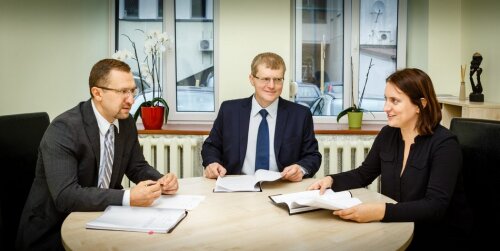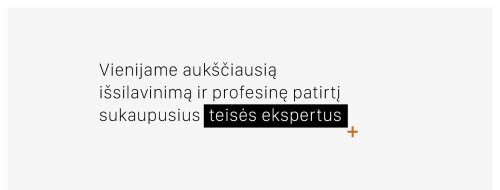Best Labor Law Lawyers in Kaunas
Share your needs with us, get contacted by law firms.
Free. Takes 2 min.
List of the best lawyers in Kaunas, Republic of Lithuania
About Labor Law in Kaunas, Republic of Lithuania
Labor Law in Kaunas, as in the rest of the Republic of Lithuania, is governed by the national Labor Code and associated legal acts. These regulations set the standards for employment contracts, employee rights, workplace safety, working hours, wages, termination procedures, and dispute resolution. Lithuania's Labor Law aims to protect both employees and employers, ensuring fair treatment, safe working conditions, and respect for mutual obligations. Residents of Kaunas, being the second largest city in Lithuania, benefit from a robust framework of labor rights and a local judiciary and labor dispute institutions ready to address employment-related issues.
Why You May Need a Lawyer
People in Kaunas often seek legal assistance in labor law due to the complexity of employment regulations and the importance of securing their livelihood or business interests. Common situations where a lawyer's help may be necessary include:
- Drafting or reviewing employment contracts to ensure lawful and fair terms - Handling cases of unfair dismissal, wrongful termination, or redundancy - Addressing wage disputes or issues with payment of overtime and bonuses - Navigating workplace discrimination, harassment, or unequal treatment - Assisting with work-related accidents, occupational safety concerns, or health issues - Advising on employee rights during company restructuring, mergers, or business transfers - Representing either party in labor disputes before the Labor Disputes Commission or in court - Guiding non-Lithuanian employees or employers through local labor law compliance
Local Laws Overview
Key aspects of labor law that are particularly relevant in Kaunas include:
- Employment Contracts: Most employment must be formalized by a written contract specifying key terms such as job position, salary, work schedule, and duration. - Minimum Wage and Working Time: Employers must comply with the national minimum wage, and the standard workweek is 40 hours, with limits on overtime. - Probationary Periods: Probation periods are typically up to 3 months, during which easier termination rules may apply. - Leave Entitlements: Employees are entitled to annual paid leave (minimum 20 working days per year) and other types of leave such as maternity, paternity, and sick leave. - Termination Procedures: Employees may only be dismissed for reasons listed in the Labor Code, following due process, and may be entitled to severance. - Non-Discrimination: Laws prohibit unfair treatment based on gender, race, disability, religion, age, or other protected characteristics. - Occupational Health and Safety: Employers are obliged to ensure a safe working environment and provide training on workplace safety. - Labor Disputes: Disagreements may be settled out of court with the Labor Disputes Commission, which is a mandatory pre-litigation step in many cases.
Frequently Asked Questions
What rights do I have as an employee in Kaunas?
Employees have the right to fair pay, safe and healthy working conditions, protection from discrimination, holiday and sick leave, and written employment contracts.
How can I terminate my employment contract legally?
You can resign by submitting a written notice (usually 20 calendar days in advance) or by mutual agreement. Employers must provide a valid legal reason for dismissal and follow due process.
What is the standard probation period in Lithuania?
The standard probation period is up to 3 months, unless a shorter period is agreed. Probation terms and related rights should be specified in the employment contract.
How do I report unfair dismissal?
First, collect relevant documents and evidence. Then submit your dispute to the Labor Disputes Commission within three months of the dismissal. A lawyer can guide you through this process.
Is it mandatory to have a written employment contract?
Yes, all employment in Lithuania, including in Kaunas, must be based on a written contract signed before work begins.
How much paid annual leave am I entitled to?
You are entitled to at least 20 working days of paid annual leave per year if you work five days a week.
Are non-EU nationals protected by Lithuanian labor laws?
Yes, all workers legally employed in Lithuania, regardless of nationality, are protected by the same labor laws.
What can I do if my employer does not pay my salary?
You should first try to resolve the issue with your employer. If unresolved, you can file a claim with the Labor Disputes Commission or get help from a labor lawyer.
What should I do if I experience discrimination at work?
Document the incidents and notify your employer or HR department. If the issue persists, seek help from the Equal Opportunities Ombudsperson or consult with a lawyer.
How are overtime hours regulated?
Overtime work cannot exceed 8 hours per week and must be compensated at a higher rate, unless otherwise agreed in certain cases outlined by law.
Additional Resources
If you need more information or immediate assistance, consider these helpful resources:
- State Labor Inspectorate (Valstybinė darbo inspekcija): Oversees compliance with labor laws and investigates workplace issues - Labor Disputes Commission (Darbo ginčų komisija): Handles pre-court labor disputes between employees and employers - Kaunas Legal Aid Office: Provides legal consultations on labor law matters - Equal Opportunities Ombudsperson: Deals with workplace discrimination complaints - Ministry of Social Security and Labour of the Republic of Lithuania: Publishes official information and updates regarding labor law
Next Steps
If you need legal assistance with a labor law issue in Kaunas, consider the following steps:
1. Gather all relevant documents, such as your employment contract, correspondence, and evidence related to your case. 2. Try to resolve the issue directly with your employer or HR department. 3. If the issue is unresolved, seek legal advice from a local labor law specialist or contact free legal aid services. 4. In the case of disputes, file a claim with the Labor Disputes Commission. This is often a required step before going to court. 5. If necessary, prepare for court proceedings with the help of your lawyer. 6. Stay informed by checking with official sources and organizations mentioned above for guidance and support.
Being proactive and informed will help protect your rights and lead to a fair and effective resolution of your labor law concerns in Kaunas, Republic of Lithuania.
Lawzana helps you find the best lawyers and law firms in Kaunas through a curated and pre-screened list of qualified legal professionals. Our platform offers rankings and detailed profiles of attorneys and law firms, allowing you to compare based on practice areas, including Labor Law, experience, and client feedback.
Each profile includes a description of the firm's areas of practice, client reviews, team members and partners, year of establishment, spoken languages, office locations, contact information, social media presence, and any published articles or resources. Most firms on our platform speak English and are experienced in both local and international legal matters.
Get a quote from top-rated law firms in Kaunas, Republic of Lithuania — quickly, securely, and without unnecessary hassle.
Disclaimer:
The information provided on this page is for general informational purposes only and does not constitute legal advice. While we strive to ensure the accuracy and relevance of the content, legal information may change over time, and interpretations of the law can vary. You should always consult with a qualified legal professional for advice specific to your situation.
We disclaim all liability for actions taken or not taken based on the content of this page. If you believe any information is incorrect or outdated, please contact us, and we will review and update it where appropriate.
















